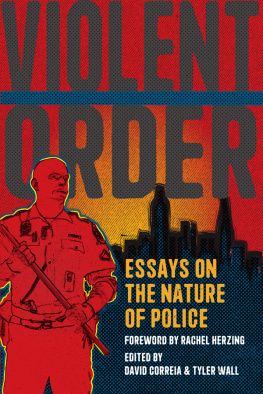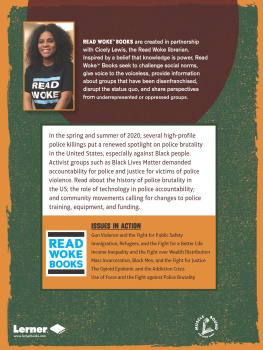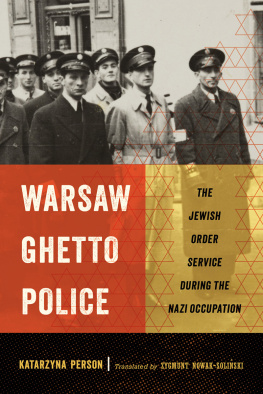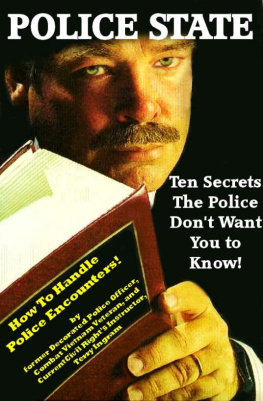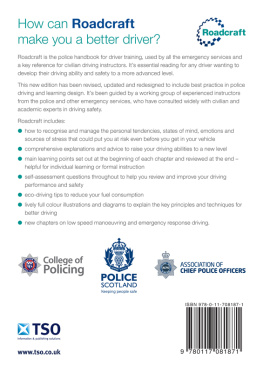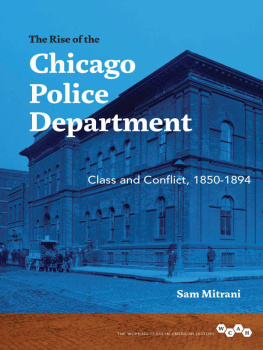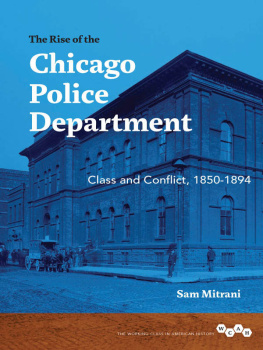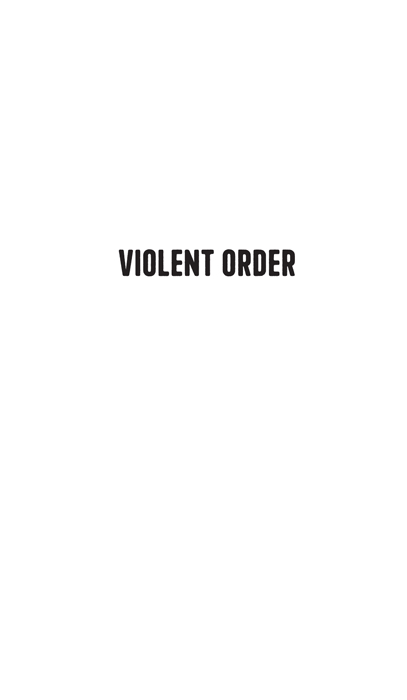
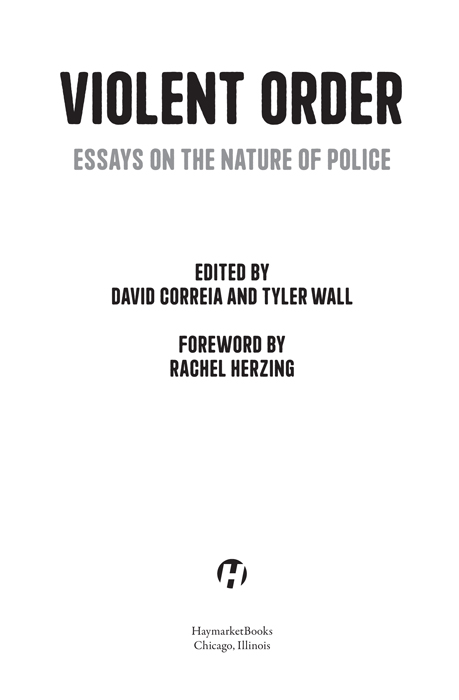
2021 David Correia and Tyler Wall
Published in 2021 by
Haymarket Books
P.O. Box 180165
Chicago, IL 60618
773-583-7884
www.haymarketbooks.org
ISBN: 978-1-64259-487-4
Distributed to the trade in the US through Consortium Book Sales and Distribution (www.cbsd.com) and internationally through Ingram Publisher Services International (www.ingramcontent.com).
This book was published with the generous support of Lannan Foundation and Wallace Action Fund.
Special discounts are available for bulk purchases by organizations and institutions. Please email for more information.
Cover design by Eric Kerl.
Library of Congress Cataloging-in-Publication data is available.

FOREWORD
THE FANTASY OF POLICE
Rachel Herzing
The summer of 2020 raged onto the calendar with a global pandemic and recession. Midway through this year of deep crisis, Memorial Day marked the beginning of an extended season of protest. The mood was already simmering with quarantine fatigue, economic desperation, and outrage over the murders of Ahmaud Arbery and Breonna Taylor by cops in official and unofficial capacities when Minneapolis police murdered George Floyd on May 25. The response in Minneapolis was explosive, as thousands of people spilled into the streets to challenge the violence of policing and the racism baked into it.swirling, why didnt all the reforms proposed in 2014 keep George Floyd from being murdered in 2020?
What was new in 2020 was a shift in community demands that dispensed with allusions about what policing is good for, instead asserting policing itself as the problem. Summer 2020 saw broad calls to defund policing coming from the grassroots. Minneapolis, the city that sparked the rebellions, went one step further by taking up demands to dismantle its police department, and cities such as Seattle and Portland followed suit. The demands coming from Minneapolis were not the spontaneous outbursts of naive activists. Rather, these demands emerged over years during which organizers applied pressure on city leaders through multiple budget cycles to shift priorities away from logics of containment and control toward health and well-being. Organizations such as Black Visions Collective, MPD 150, and Reclaim the Block translated those years of organizing into clear demands that Minneapolis residents embraced and city leaders committed to moving forward.
Action on the streets played out against a backdrop of a shifting national conversation about policing, racism, and priorities. Corporate media outlets from cable news to the New York Times ran stories and published commentary making a case for redirecting resources from policing and toward life-affirming programs, policies, and practices, particularly for Black communities. Tool kits, reports, and opinion pieces demonstrated why and how defunding policing could be done. The issue of defunding policing even found its way into the 2020 presidential election, with each major candidate taking the opportunity to pander to law enforcement agencies and assure voters that they wouldnt support such a radical agenda. Organizers, on the other hand, took the opportunity to press further, making a public case for abolishing policing entirely.
The backlash by cops against demands to defund and abolish policing began almost immediately. Bob Kroll, president of the Police Officers Federation of Minneapolis, cast aspersions on George Floyd and on the organizers promoting transformation of policing in the city. Local police forces were joined by federal cops and the National Guard to suppress the rebellions nationwide. Cops across the United States slowed down or stopped responding to calls for service while simultaneously promoting the theory that US cities were suffering under an epidemic of gun violence and spiking crime rates that
And then, of course, there was Kenosha. On August 23, 2020, Kenosha, Wisconsin, police shot Jacob Blake in the back seven times in front of his children, critically injuring him. The shooting was followed by multiple nights of protest that the Wisconsin National Guard was deployed to quell. On the night of August 25, Kyle Rittenhouse traveled to Kenosha from Antioch, Illinois, in response to a call over Facebook from the far-right group the Kenosha Guard for vigilantes to mobilize to the city to protect property from protestors. Rittenhouse, encouraged by local cops who told him, We appreciate you guys, we really do, walked among the protestors, a semiautomatic rifle slung over his shoulder. He went on to shoot two people dead and injure another before the night was over.
Kyle Rittenhouse was recorded on video on the streets of Kenosha with members of the Kenosha Guard and Boogaloo Bois even as cops directed others to leave the streets under a curfew order. Calls similar to the one that brought Rittenhouse to Kenosha also went out across the country as far-right forces mobilized under the pretense of protecting property from the looters and vandals Donald Trump tried to convince the country were putting us all in peril. These groups joined the police project of maintaining order. In doing so they also had free rein to harass, intimidate, provoke, and physically harm protestors.
Kyle Rittenhouse was broadly referred to in the media as a teen or a youth. While his age, seventeen, made that unremarkable, it does stand in stark contrast to the public descriptions of twelve-year-old Tamir Rice, eighteen-year-old Michael Brown, or seventeen-year-old Trayvon Martin, who were respectively referred to as menacing, a demon, and suspicious. Rittenhouse also didnt suffer the character assassinations victims of police violence often experience, with information about any previous law enforcement contact reported as frequently as the details of the violence they experienced.
During the intervening years between the uprisings in Ferguson and Minneapolis, the proposed reforms did not lead to big changes in policing. Black Lives Matter took on unprecedented cultural currency, the Obama administration convened a task force on policing, and a series of consent decrees were implemented in cities including Ferguson and Baltimore. However, the number of people killed by cops did not substantially drop. Nor did the daily indignity of surveillance, harassment, and violence visited on the targets of US state repression, especially Black ones, abate significantly. The Obama task force yielded predictable, stale recommendations. Consent decrees and federal monitoring of police forces across the country merely overlaid the business as usual of policing with a veneer of accountability. Rather than these being the wrong reforms, the failure of these reforms rests more properly on a misunderstanding (or willful ignorance) of what policing is and doesthe very nature of policing. Plainly stated, policing is a set of practices empowered by the state to enforce law and maintain social control and cultural hegemony through the use of force. A misunderstanding of what policing is and does fuels the continued attempts to apply half measures rather than to transform policing or the conditions in which it is legitimated.
We know that any demand to change policing is only as good as the ends to which organizers leverage it. As the demand to defund the police gained momentum across the United States, it was interpreted to mean everything from defund as a means to abolish policing to defund as a way to redistribute policing resources within the institution, for example from new equipment to new training. Liberals declared that the demand to defund the police cost Democrats congressional seats in the 2020 elections and lamented that if only people calling for the police to be defunded didnt ask for what they actually want, but rather repackaged the demand in other language (i.e., made different demands) policing could be fixed. The different purposes to which the demand to defund policing has been put return us to the question of the nature of policing. If we believe policing to be an institution dedicated to promoting safety and security, then we could reasonably assume that improving policing increases safety. If we understand policing as both depending on and generating violence, however, then we understand that the only true way to end the violence of policing is to end policing.
Next page
